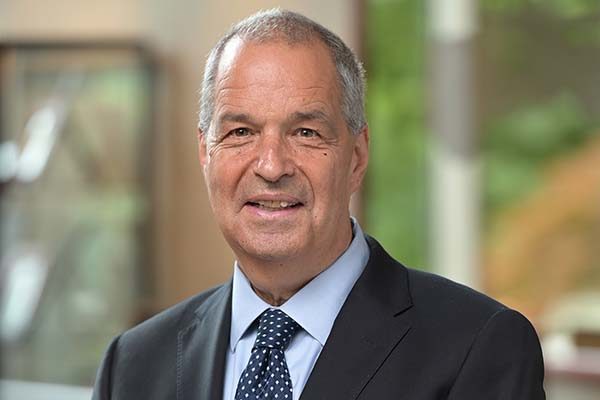InPerson interview: Geoff Muessig of Pitt Ohio
In our continuing series of discussions with top supply-chain company executives, Geoff Muessig discusses the less-than-truckload market, choosing a carrier partner, and his company’s sustainability initiatives.

Geoffrey Muessig is executive vice president and chief marketing officer for Pitt Ohio, a Pittsburgh-based regional trucking firm that specializes in less-than-truckload (LTL) carriage. Muessig has more than 34 years of experience in the transportation industry and has been with Pitt Ohio since 1988, when he started his career as a sales representative. In addition to leading Pitt Ohio’s sales and marketing efforts, he serves as chairman of the LTL Digital Council. Muessig holds an M.A. in history from the University of Chicago and an MBA from the University of Pittsburgh.
Q: The trucking industry has gone through a lot of change this year. What is the current state of the market and how is Pitt Ohio reacting?
A: Year-over-year demand for domestic surface transportation services has declined. It is well documented that the pandemic created a surge in demand for goods, which benefited every mode of U.S. transportation. In the pandemic’s aftermath, the American consumer has pivoted toward spending more money on services.
Demand for surface transportation services has declined from the pandemic’s peak years. However, it is important to note that most trucking companies are handling more shipments and tonnage post-pandemic than they did pre-pandemic.
Furthermore, the structure of the LTL and TL [truckload] freight markets differ. The 20 largest LTL carriers handle the preponderance of LTL shipments, while the 20 largest TL carriers handle a much smaller percentage of TL shipments. In the face of a shipment decline, the structure of the LTL market works to promote price stability, while the structure of the TL market promotes much more price volatility.
Pitt Ohio is focused on improving our value proposition for our customers. We are working to reduce our administrative expenses by digitizing the exchange of information with shippers, 3PLs, and partner carriers. Furthermore, we have expanded our coverage area to include upstate New York, and we have successfully launched an express three-day service to California [from the carrier’s core Mid-Atlantic territory]. In the third quarter of 2023, Pitt Ohio’s Supply Chain business unit will deploy a freight forwarding solution.
Q: As a leading regional carrier specializing in LTL, what are the most important reasons for your company’s growth and success?
A: Pitt Ohio’s success is built on the consistent hard work and effort of our employees. We message to our employees and our customers that “our employees come first and our customers come a close second.” Pitt Ohio works hard to create a strong business culture that promotes employee engagement.
More than 75% of our drivers and dockworkers tell us in companywide surveys that they would highly recommend Pitt Ohio to their friends and family members as a good place to work. Higher employee engagement translates into less absenteeism and more attention to detail, which leads to better on-time delivery service and fewer freight claims. Better service and fewer freight claims lead to increased customer loyalty, growth, and success. In short, happy employees create happy customers.
Q: What should shippers look for in partnering with an LTL carrier?
A: All LTL carriers handle LTL shipments, but all LTL carriers are not interchangeable. Pitt Ohio focuses on fit when we seek to partner with a shipper. Shippers should be able to clearly articulate their priorities to their existing and potential carrier partners.
Coverage area, service performance, and price are important determinants, but niche needs—like the ability to perform liftgate and residential deliveries or safely transport hazardous material, high-value shipments, or fragile goods—determine whether one carrier is a good fit and another carrier is not.
Shippers should also consider the delivery profile of their customers. Some LTL carriers focus on serving the retail market, while other carriers focus more of their time and attention on serving industrial customers. Service expectations and equipment requirements vary between these market segments.
All shippers should focus on the days to pay their carrier. More than 70% of an LTL carrier’s costs are paid each week since an LTL carrier pays its drivers weekly and buys their fuel daily. Cash flow is significant for even the best-capitalized and best-operating LTL carriers.
Q: What is the one thing that shippers could do to better prepare their LTL shipments?
A: The shipper should communicate their shipping plan early in the day. Early communication allows the carrier to plan and execute its work with fewer errors and less cost. The shipper should update the carrier during the course of the day if the shipping plan were to change. Digital API/EDI communication is preferred to phone calls and emails.
LTL carriers’ costs are driven by time, distance, and space. A shipper should prepare each LTL shipment handling unit to maximize the pounds per cubic foot of the shipment, while minimizing the amount of space that the shipment occupies in the trailer. The extra time and expense that is spent improving the density of a shipment handling unit is more than offset by the reduction in the carrier’s cost and the price that will be charged to the shipper.
Providing shipment handling dimensions in addition to the weight for each LTL shipment will enable carriers to reduce their costs and their prices while also reducing carbon emissions on a per-shipment basis.
Q: Pitt Ohio has an extensive sustainability program. Why is this important to your company and what do you hope to achieve?
A: In 2013, Pitt Ohio initiated a sustainability strategy with a focus on people, planet, and purpose. Over the years, we have engaged our employees to take many small actions that collectively make a big difference. In the past five years, Pitt Ohio’s carbon emissions per shipment have declined by 6.1%. Pitt Ohio’s sustainability strategy has enabled the company to differentiate itself in a crowded marketplace. The sustainability strategy has enabled the company to strengthen our work culture, improve our efficiency, grow our business, and give back to the communities where we operate.
Pitt Ohio gets a lot of attention for using energy generated by our terminals’ onsite wind turbines and solar panels to power our buildings and some of our equipment. However, the vast preponderance of Pitt Ohio’s carbon emissions come from our trucks. Pitt Ohio’s strong work culture has galvanized our drivers and mechanics to improve fuel efficiency and reduce carbon emissions each and every day.
These daily small actions involve the successful execution of business basics: Fully utilize the cubic capacity of trailers, put the right-size shipment on the right-size truck, reduce empty miles, accelerate and brake gradually, and ensure that all of the tires on the trucks in our fleet are properly inflated. Proper execution of these business basics has enabled Pitt Ohio to boost its fleet’s mpg performance by 8% in the past five years. Less fuel is consumed, less carbon is emitted, and more dollars are saved.
Pitt Ohio’s sustainability initiative enables the company to position itself as an employer of choice. We find that some drivers are interested in driving new electric vehicle trucks. We also find that employee candidates want to work for a company that is focused on reducing emissions and giving back to local communities.
Q: You are the chairman of the LTL Digital Council. Would you describe the work of this group and its significance for the industry?
A: Over time, freight rates increase due to rising labor, equipment replacement, insurance, and toll costs. Successful carriers look to other areas to offset these rising costs. The LTL trucking industry has been slow to automate administrative processes. Today, most LTL shipments are tendered to a carrier with a paper bill of lading.
An LTL carrier’s costs will decrease and its service will improve when it digitizes the exchange of information between shippers, 3PLs, and carriers. Today, most shippers manage their customer orders in a digital format. However, when the shipper picks, packs, and creates an LTL shipment, this digital information is converted to a paper bill of lading. Then the carrier needs to pay an employee resource to transpose this information back into a digital format so that the shipment can be managed in the carrier’s operating system. Small-package orders have been digitally transmitted between shippers and carriers for more than 20 years.
The creation of a standard LTL billing-of-lading API [application programming interface] simplifies the process for LTL shippers, 3PLs, and carriers to move to digital communication. Digital communication will reduce cost and improve service.
The good news is that the LTL industry has made significant progress in the area of digitalization in 2023. Eight carriers have fulfilled the pledge to build an API to the NMFTA’s [National Motor Freight Traffic Association] digital bill-of-lading standard. They represent 37% of LTL industry revenue. Combined with all carriers that have pledged, they represent 72% of industry revenue.Related Articles

Copyright ©2024. All Rights ReservedDesign, CMS, Hosting & Web Development :: ePublishing